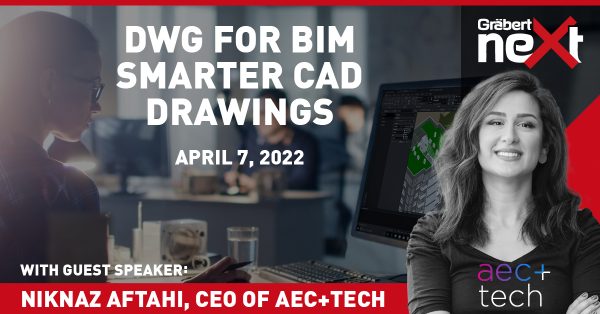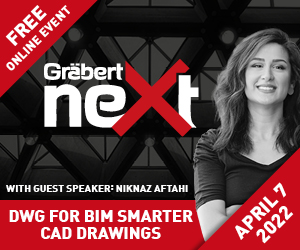Niknaz Aftahi is changing the way AEC Professionals Discover New Tools and Technologies

The CEO and founder of aec+tech Niknaz Aftahi, believes that everyone — from architects to outlaw students — should have access to the latest knowledge, and she’s determined to help.
Niknaz Aftahi’s journey to becoming a CAD expert
At first, Niknaz Aftahi’s story may not seem particularly unusual: A highly motivated student graduates from a prestigious California university, then goes to work as an architect and design technology director in the San Francisco Bay Area. But that’s not the end of this singular story — or the beginning.
Before coming to the United States, Ms. Aftahi’s student years were marked by fierce struggle — not to get good grades, but to get any education at all. Growing up in Iran, she was subject to discriminatory government policies that barred all members of the Baha’i faith from universities and colleges. Her only hope was the Baha’i Institute for Higher Education (BIHE), an underground school run by volunteers who risk imprisonment for their defiance.
The Iranian government does not recognize undergraduate degrees completed through the BIHE, despite the organization’s rigorous academic standards. But elsewhere, BIHE students are admitted into advanced degree programs at a growing number of universities — including UC Berkeley, which welcomed Ms. Aftahi, the first-ever graduate of the BIHE architecture program.
Today, Ms. Aftahi continues to participate in the BIHE — this time as a teacher, remotely supporting the students committed to pursuing education in the face of religious oppression. She also seeks to boost knowledge among AEC professionals and is helping them learn about, evaluate, and select software tools through her aec+tech platform.
Join Niknaz Aftahi at the online CAD event Graebert neXt
Ms. Aftahi will also be the guest speaker for a 30-minute technical keynote in the Graebert neXt online event on April 7, 2022. Register now to save your spot for “DWG for BIM: Smarter CAD drawings for your BIM projects,” plus other keynote sessions including “Cloud CAD & Mobile CAD in DWG,” “DWG for Mechanical,” and “What’s Next for 2D/3D CAD in DWG?” (Users in Japan, DACH, and India are invited to attend special localized online events coming in May.) By way of introduction, Ms. Aftahi shares her thoughts about education, AEC technology, and the future of the AEC industry in this Q&A.
Graeberts Interview with Niknaz Aftahi
Graebert: How did your experiences with the Baha’i Institute for Higher Education (BIHE) affect how you think about technology and our access to it?
Ms. Aftahi: During my undergraduate studies at the BIHE in Iran, I experienced not having access to many educational resources. I couldn’t even go to libraries because I didn’t have an official student ID. I basically didn’t exist as a student, because the government of Iran doesn’t recognize the BIHE institute.
Not only do they ban Baha’is from entering the country’s national universities, but they also do not tolerate it when the community organizes their own educational system under suppressive circumstances. The classes have been raided by the police many times, our professors have been arrested and put in jail, and books and computers have been confiscated. Classes had no permanent location and we had to go from one house to another. We knew how important it is to have access to high-speed Internet and a reliable cloud system; the government of Iran constantly hacks the BIHE website, so we became experts in protecting our data and quickly switching from one system to another.
BIHE instructors have years of experience with teaching online, sometimes reaching across many time zones to the students in Iran. That is why, when the pandemic forced many schools around the world to move online, I tried sharing some of my learnings with others. My entire experience at the BIHE, and studying with the help of a community of Baha’i professors and families — who collectively worked hard to sustain the institute — showed me that it has endless rippling effects when you help others access resources.
I do believe everyone should have access to the latest knowledge, including new technologies, in any field they work in, regardless of whether they come from a technical background or not. Anyone should be able to easily learn how to improve their workflow — and their life in general — with the help of relevant new tools and technologies. My goal with aec+tech is that we democratize access to the latest products, and we also make it very simple to understand what the real-world applications of each tool are.
Graebert: What role does aec+tech play for the AEC world now, and how would you like that to evolve in the future?
Ms. Aftahi: AEC is going through so much innovation that conferences and publications alone just don’t cut it. In the last couple of years, we’ve witnessed a significant amount of research and innovation, and now billions of dollars ($3.1 billion in 2019 alone) are being invested by VC companies on AEC tech start-ups and new software and products. Over the past decade, we’ve seen a doubling of venture capital funding into construction.
But the way the building industry is keeping up with new technologies is outdated, disconnected, and decentralized. There is no easy way for design and construction firms to find and compare new software and technologies. Of the 800,000 AEC firms in the US, only 1–2% have a designated person or team functioning as technologists who are either making in-house tools or are learning and adopting new digital tools. The rest are all falling behind.
Almost all small and midsize firms lack the time and money to test new products. They are constantly busy with meeting deadlines or pursuing new projects, and yet they are building the most important parts of our cities, including apartment buildings, car parks, and hotels. There is a growing number of conferences and webinars focused on AEC tech, but they are often expensive and lengthy, and many companies don’t have the budget to send employees to participate in them.
As a result, when it comes to learning about AEC tools, the vast majority of these professionals are limited to talking to the people they already know, who may or may not be the right resources for that information. It’s inefficient, time-consuming, often inaccurate, and relies on anecdotal data: Imagine if doctors found out about their tools through their friends and social media!
Our mission, therefore, is to help AEC companies find the best tools/tech for their practice and help tech companies find the right customers for their innovative solutions and software. That includes connecting groundbreaking AEC startups with partners, customers, and capital. With the aec+tech platform, we are offering a centralized online resource and database for the industry to keep up with the latest AEC tools and technologies and discover the real-world applications of these new tools in the AEC space. The goal is to become a one-stop shop for finding the best AEC products, and also to be a thought leader.
Rather than promoting particular tools, we will remain unbiased. We’ve registered more than 120 technology companies so far, and we have a number of prominent AEC firms including Walter P Moore, NBBJ, Bjarke Ingels Group, WRNS Studio, and others who have profiles on the platform and are engaged with the project. We are currently expanding the presence of developers and builders as part of the potential customer base. We also have a number of VC investors who are following our work and are interested in continuously learning about new tools through aec+tech.
The next step for us, besides growing our community and bringing innovative companies on board, is to collect more case studies. The goal is to build a library of thousands (instead of the hundreds of case studies that we currently have), and to leverage the data to become an AI-powered platform. Our advisor on machine learning and data science is going to help us develop a matching and recommendation system that would recommend the right tool to users, based on their company and project type and size. We are not there yet as far as the amount of data that we need for the AI technology, but we will get there soon! We are now focused on extending our presence in both the tech and in the industry, and learning from both sides. We keep adding new features to the platform, to improve our search engine optimization or SEO, and make it as accurate as possible for users to find similar tools and similar companies.
Graebert: Looking into the future for AEC professionals, do you have any predictions about how their software and hardware tools will change over the coming years?
Ms. Aftahi: We are living in a world where cloud flexibility, distributed teams, and remote/hybrid work are becoming the standard in so many other areas, and the new generation of architects, designers, and builders have more of an open mind and an appetite for doing things differently. The constant growth of digital tools and methodologies in the AEC space is a sign that AEC has finally started to learn from the practices and dynamism of the tech industry.
We at aec+tech are organizing all the technologies into various categories, including energy modeling, AI-powered, project management, generative design, construction technologies, AR/VR and many more. We are also categorizing those who are using these tools based on their company size and type.
I think the future of AEC technologies is not about one particular tool or piece of technology, but rather the better integration of many exciting products that can — finally — all easily communicate and work with one another. Currently, the process of design and construction is pretty manual and disconnected, from the very beginning of programming and planning, until the last stages of construction and later, operation. In the near future, all these separate steps and pieces of software will smoothly blend into each other and empower designers and contractors to work more efficiently. That is why I never see aec+tech community members as competitors, but instead, I think all AEC tech companies have to work together to collectively revolutionize the industry and the current workflows. The $11.16 trillion AEC industry has room for all well-executed tools and technologies to excel.
Graebert: What do you consider a highlight of your career? Is there anything you haven’t yet done that you would like to do?
Ms. Aftahi: The highlight of my career so far has been starting my own company. Being a founder means you have to embrace many uncertainties and be ready to work for free for a long time until your idea is well-executed, and you have a developed product. It takes endless hours of meetings and consultations with your potential users and collaborators. I have been lucky to gradually get connected to a group of smart colleagues, collaborators, and advisors who have an in-depth understanding of our goal, and who have all lived through the pain points we are solving at aec+tech.
The one thing I have not done in my career (and I keep postponing) is advance my coding and programming skills! I constantly have ideas for the future of aec+tech, and most times I lack the technical knowledge that is necessary to fully understand some of these ideas! I’d like to expand my technical knowledge in understanding and analyzing big data, especially now with the increasing traffic we are getting and our expanding presence in the market.
Meet Niknaz Aftahi at Graebert neXt
To book your spot for the event, please register today for the Graebert neXt online event on April 7, 2022, for a 30-minute technical keynote.
Meet the inspiring speaker Niknaz Aftahi (CEO+Founder of AEC+Tech) and other inspirational speakers like Anthony Frausto-Robledo (Architect, Publisher, and Editor-in-Chief at Architosh) and Randall Newton (Conference speaker, journalist, business analyst for engineering tech).
Some topics covered in the keynotes include “DWG for BIM: Smarter CAD drawings for your BIM projects, “Cloud CAD & Mobile CAD in DWG,” “DWG for Mechanical,” and “What’s Next for 2D/3D CAD in DWG?”.
To guarantee your seat at the event, please register as soon as possible!
Please note: users in Japan, Germany, and India are invited to participate in special localised online events in May.

